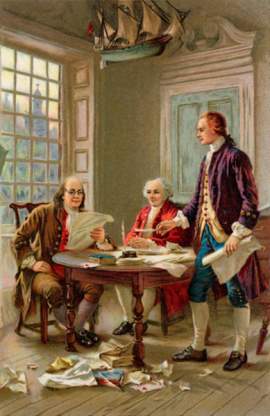
The Importance of Constitutional Law

Popular In Constitution
Purpose Of Lifetime Appointment And Pros And Cons Enumerated Powers Bicameral Legislature Background Article 3 Of The Constitution We The People 1st Amendment Who Wrote The Constitution Judicial Review Equal Protection Clause 5th Amendment 10th Amendment Three Fifths Compromise
Constitutional law is an essential foundation of the United States' existence as a unified and centrally-administered nation. The nation's Constitutional laws were passed early on, but not immediately, in the nation's history. Constitutional law was preceded by the looser framework of the Articles of Confederation, the set of laws initially created by the Second Continental Congress while the Revolutionary War was still raging.
Unlike Constitutional law, this embryonic form of the nation's legal system vastly favored individual states over the Federal Government, which at that point possessed only limited rights. The loose format of the Articles of Confederation accorded well with the enthusiasm for independence felt during the Revolutionary War. During the early year of the country's safe and effective independence from England it came to seem to some, though not to all, political observers and figures to be insufficiently effective.
The initial impetus for the creation of centralized Constitutional laws came from the Annapolis Convention, held in September 1784 between Delaware, Virginia, New York, New Jersey, and Pennsylvania to discuss the Articles' insufficiency for regulating commerce. Due to the low level of attendance, the Convention produced only an invitation to the other states to attend a later convention for revising the national legal system. This invitation was accepted by all of the states save Rhode Island.
The resultant Constitutional Convention began in May 1787. To clear the hurdle of the controversy stirred up by the prospect of more extensive Constitutional laws, the Convention adopted the resolution that ratification would depend on only nine out of thirteen states.
Debates on Constitutional laws revolved around two opposing programs for legislation. James Madison, generally considered the leading figure behind the movement toward Constitutional law, proposed what was termed the Virginia Plan, which was opposed by the so-called New Jersey Plan, as formulated by William Paterson. Beyond the varying individual details that differed between these two plans, their basic philosophical divide existed on the balance of power between larger and smaller states.
The Virginia Plan gave larger states a proportionally greater share in the national legislature, while the New Jersey Plan was based on the principle of equal rights. The "Great Compromise" was brokered to resolve this issue, thereby creating the American electoral system and the structure of two Houses of the Legislature.
Securing the ratification of the Constitution by the required nine states was a fraught process. The last of the required ratifications was made by New Hampshire. Once the authorization of Constitutional law was thus secured, the hold-out states of New York, Virginia, Rhode Island, and North Carolina gradually followed in ratifying the Constitution.
To mollify the many opponents of the proposed Constitution, the drafters made a promise to later pass the ten Amendments which after the fact would become known as the Bill of Rights. Having been initially discussed during the 1788 debates, the Bill of Rights were formally proposed by Madison in 1789 and became a primary tenet of Constitutional law in 1791.



















